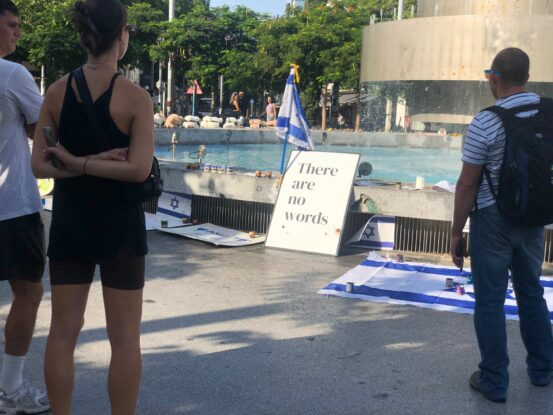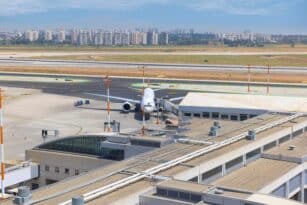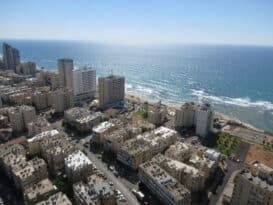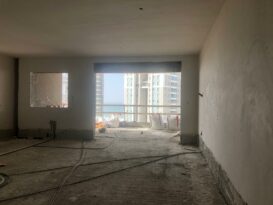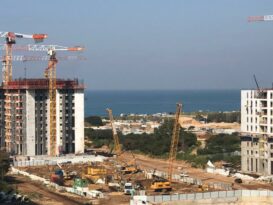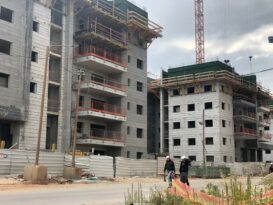A severe shortage of manpower that will lead to construction delays, and low demand that is expected to last for months are just some of the negative effects that Operation Iron Swords is expected to have on the real estate industry in Israel. However, the war has also created opportunities to purchase homes at attractive prices, and for foreign buyers, in particular, the strengthening dollar and rising anti-Semitism provide further motivation to do so.
Even before the start of Operation Swords of Iron — the Israeli military response to the deadly Hamas terrorist attacks in southern Israel on October 7th, the residential real estate industry in Israel was in one of the worst states it has known in the past 20 years. A combination of factors including high interest rates, a crisis in the high-tech industry, and the judicial reform movement, led to a drop in demand and transaction volumes that were tens of percent lower than they were in 2021-2022.
But if before the war the state of the Israeli real estate market was tough, today, almost a month since it began, it is catastrophic. Alongside the demand that has now completely disappeared, the industry’s production capacity has also been severely damaged.
The reason for this is first and foremost the departure of most of the manpower on which the industry relies. Before the war, the construction industry employed around 100,000 Palestinian workers, 80,000 from Judea and Samaria and approximately 20,000 from Gaza. None of them have been able to enter Israel since the outbreak of the war, and it does not appear that they will return to work in the foreseeable future. In their absence, the sector is left with some 14,000 foreign workers from Moldova, Ukraine, and China (another 3,000 left Israel at the start of the war) and several tens of thousands of Israelis, most of whom belong to the Arab sector.
The bottom line is that the industry today can rely on only about 30% of the manpower that operated in it before the war. In response, the government is trying to bring in tens of thousands of foreign workers to fill the void left by the Palestinian workers, but it is clear that this is not a step that can be taken now, and in any case, as long as the war continues, the motivation of foreign workers to come to Israel will be low.
Another delaying factor is the decision of some of the municipalities not to allow the opening of construction sites in their areas at all. In fact, during the first two weeks of the war, it was the joint policy of almost all the municipalities that ordered the closure of sites, but while some of them allowed them to open later, a series of large and central cities still refuse to allow it, among them Rishon LeZion, Ramat Gan, Givatayim and Bat Yam. The reason for this is the concern that most of the manpower at the construction sites is Arab. Although these are Arab citizens of Israel, according to the municipalities that refuse to allow the sites to open, it cannot be ruled out that there will be those who identify with the enemy, and that they may try to carry out attacks against the civilian population in the cities. Last week, the Association of Contractors filed a petition against those municipalities, which is currently being heard in court.
The obvious effect of these two factors is clear, namely significant delays expected in the delivery of the apartments, although at the moment it is not possible to estimate their scope. Already, development companies have begun to send letters on their own initiative to buyers informing them that they will not be able to meet the deadlines specified in the contract.
Another heavy effect of the war is on the consumer side, namely a sharp increase in demand for apartments with a mamad, or safe room, whose walls are built of reinforced concrete, which is required in every new apartment built in 1992 or later. This is an understandable development, since residents in most parts of the country, especially in the central region, have been required to enter a safe room at least once a day since the war began. In southern cities, such as Ashkelon, Ashdod, Netivot, and Be’er Sheva, the frequency is even higher. For this reason, there have been increasing reports in the Israeli media recently about a decline in rental prices for apartments without a safe room.
As far as home purchases are concerned, the market, which was already in a severe slowdown even before the war, is expected to enter an almost complete stagnation. In addition to the severe economic crisis that the country is expected to enter, according to forecasts, about 350,000 civilians are enlisted in the reserve army and hundreds of thousands are engaged in various volunteer activities to support the army and the residents of the evacuated communities in the south of the country.
While low demand is expected among Israeli residents in the coming months, the real estate industry hopes that in the coming months demand for apartments from foreign residents will increase. This is partly due to the growing fear of anti-Israeli and anti-Semitic currents in their countries of residence, which increase the motivation to hold property in the country in anticipation of possible immigration, and as a way to show sympathy and support toward Israel’s economy in its difficult hour.
To this should be added the dramatic strengthening of the dollar over the past year, particularly since the beginning of the war, which is expected to significantly ease the purchasing capabilities of those whose income is in foreign currency. Last week, the value of the dollar crossed the NIS 4 threshold for the first time in many years, and as of this writing stands at NIS 4.06 – its highest value in the past 11 years.
Since the beginning of Operation Iron Swords, the dollar has jumped by about 5 percent, but this is a continuation of a trend that has been going on for the past two years, in which the dollar climbed from a low of NIS 3.1 (in November 2021) by about 30 percent. To illustrate, an apartment that costs NIS 2 million today will cost a little less than $493,000, whereas two years ago this amount translated to $645,000.
“This is a historic event that brings a lot of sympathy from foreign residents and a desire to help the country,” says an apartment marketer with whom we spoke, “Everyone understands that after a war there is an economic boom, and the dollar that jumped created an irrevocable opportunity for foreign residents.”
Add to this the fact that many contractors are “stuck with the goods” while continuing to pay a fortune of financing costs on the land they purchased and will therefore be willing to sell their apartments at prices significantly lower than those offered by them a few months ago.
Against the background of the economic situation, the second-hand apartment market may also provide attractive purchase opportunities. Over the past few years, which have been characterized by rising prices alongside an economic boom and zero interest rates, tens of thousands of middle-class households have purchased expensive apartments with high leverage, while taking out burdensome mortgages of NIS 1, 1.5, and even NIS 2 million, assuming that the monetary interest rate, which stood at zero for a decade, will remain at this level.
However, beginning in April 2022, the Bank of Israel began to raise the interest rate rapidly, to 4.75 percent, and significantly increased mortgage payments. At the same time, the Israeli economy actually entered a period of recession. Now that Operation Iron Swords has broken out, it is estimated that the recession in the economy will worsen. In this reality, many homes purchased in recent years with high leverage are expected to go on sale.
Everybody wants a Buyitinisrael, now more than ever before. Whether you’re thinking about Aliyah, looking for a home or a haven, or want to support the Israeli economy, drop us a line, when you’re ready to talk. Whatever the reason, Buyitinisrael.
